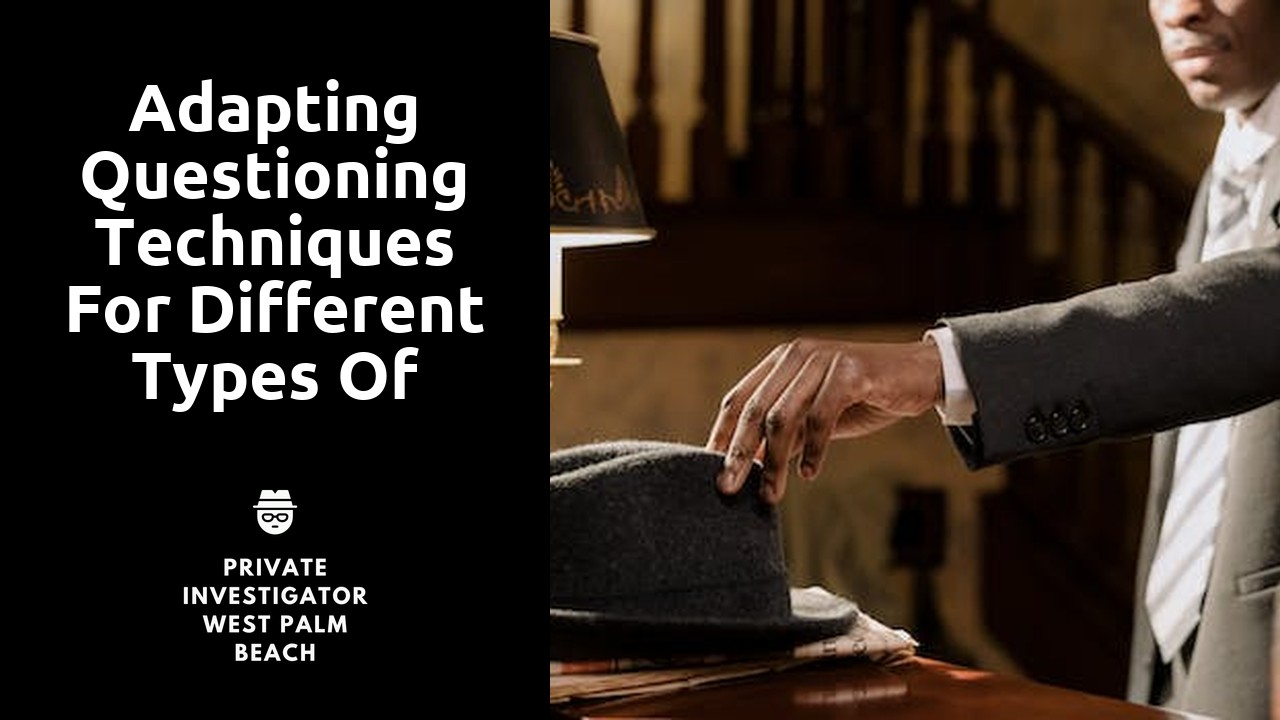
Adapting Questioning Techniques for Different Types of Witnesses
Mastering the Art of Tailored Questioning Strategies
Tailored questioning strategies are essential for any skilled interviewer seeking to elicit accurate and comprehensive information from witnesses. In order to successfully navigate the intricacies of interviews, it is crucial to understand that a one-size-fits-all approach simply does not work. Each witness possesses individual experiences, perspectives, and cognitive capacities that must be taken into account. By customizing our questioning techniques, we can establish rapport, build trust, and ultimately achieve superior results.
To begin with, it is important to conduct thorough background research on the witness prior to the interview. This will enable the interviewer to identify any relevant factors that can help guide the questioning process. Whether it is a professional background, personal history, or cultural influences, understanding these aspects will allow for the creation of tailored questions that resonate with the witness's unique perspective. By demonstrating a genuine interest and knowledge of their background, the interviewer can set the stage for a productive and fruitful interview.
Unleashing the Power of Effective Witness Interrogation
Effective witness interrogation is an art form that requires careful planning and execution. It involves the use of strategic questioning techniques to elicit accurate and reliable information from witnesses. The goal is to uncover the truth and generate a clear and compelling testimony.
One key aspect of effective witness interrogation is the ability to establish rapport. By creating a comfortable and trusting environment, the witness is more likely to open up and provide honest answers. Building rapport involves active listening, empathy, and showing genuine interest in the witness's perspective. Through this connection, the interrogator can navigate through sensitive topics and gain valuable insights. It is through this emotional connection that the true power of effective witness interrogation is unleashed.
The Key to Unlocking Testimony: Customized Questioning Approaches
Customized questioning approaches play a crucial role in unlocking valuable testimony from witnesses. This technique involves tailoring the questions to suit the unique characteristics and background of each individual witness. By doing so, attorneys and investigators can effectively probe for information and elicit more accurate and detailed responses.
One of the key benefits of customized questioning approaches is that they help establish rapport with the witness. By showing a genuine interest in their perspective and adapting the questioning style to their communication preferences, the witness is more likely to engage in a collaborative and honest manner. This can be particularly important when dealing with witnesses who may be apprehensive, disengaged, or unfamiliar with the legal process. Customized questioning allows for a more comfortable and open environment, facilitating the witness's willingness to share crucial information.
A Closer Look at Tailoring Questioning Techniques for Diverse Witnesses
Tailoring questioning techniques for diverse witnesses requires a careful understanding of the individual's background, communication style, and emotional state. Every witness is unique, and their experiences and perspectives can greatly impact how they respond to questions. Therefore, it is crucial for interviewers to approach each witness with empathy and respect, creating a safe and supportive environment for them to share their testimony.
One important factor to consider when tailoring questioning techniques is the witness's cultural background. Cultural norms and beliefs can influence how individuals interpret and respond to questions. Understanding these nuances can help interviewers avoid any unintentional miscommunication or offense. It is essential to approach the witness with an open mind, being mindful of any potential biases or assumptions that may impact the questioning process. By demonstrating cultural sensitivity and adapting the questioning style accordingly, interviewers can foster trust and encourage witnesses to provide accurate and honest testimony.
The Science Behind Crafting Targeted Questions for Different Testimonies
Effective questioning strategies are a crucial element in obtaining accurate and reliable testimony from witnesses. The science behind crafting targeted questions for different testimonies lies in understanding the unique characteristics and perspectives of each witness. By taking into account factors such as the witness's background, knowledge, and experience, one can tailor questions that are specifically designed to elicit the most relevant and valuable information.
One important aspect to consider when crafting targeted questions is the cognitive abilities of the witness. Different individuals have varying levels of cognitive processing skills, which can affect their ability to recall and articulate information. By using techniques such as asking open-ended questions and breaking complex information into smaller, more digestible parts, witnesses with lower cognitive abilities can be better supported in providing accurate testimony. Similarly, witnesses with high cognitive abilities may benefit from more detailed and nuanced questions that challenge their thought processes and elicit deeper insights.
Enhancing Your Questioning Arsenal: Strategies for Various Witness Types
Enhancing Your Questioning Arsenal: Strategies for Various Witness Types
Crafting effective questioning strategies requires a deep understanding of the diverse witness types one may encounter in legal proceedings. Each witness brings a unique perspective and set of experiences to the stand, and it is essential for legal professionals to tailor their approach accordingly. By employing a range of techniques, lawyers can significantly enhance the effectiveness of their questioning strategies and elicit valuable testimony.
One such strategy is to consider the emotional state of the witness. Emotional witnesses may require a more empathetic approach to build trust and encourage open communication. Showing understanding and sensitivity can help create a supportive environment in which the witness feels comfortable expressing their thoughts and emotions. Conversely, when dealing with more rational witnesses, adopting a logical and precise questioning approach may prove more effective in obtaining precise answers and dissecting complex issues. Adapting to the witness's individual traits and adapting one's questioning style accordingly is critical in maximizing the chances of obtaining truthful and coherent testimony.
Related Links
Building Rapport through Effective QuestioningThe Power of Follow-Up Questions: Uncovering Hidden Information
Integrating Psychological Understanding in Investigations
Using Psychological Profiling to Solve Cases
Psychological Tactics in Interrogation
The Importance of Active Listening in Investigations